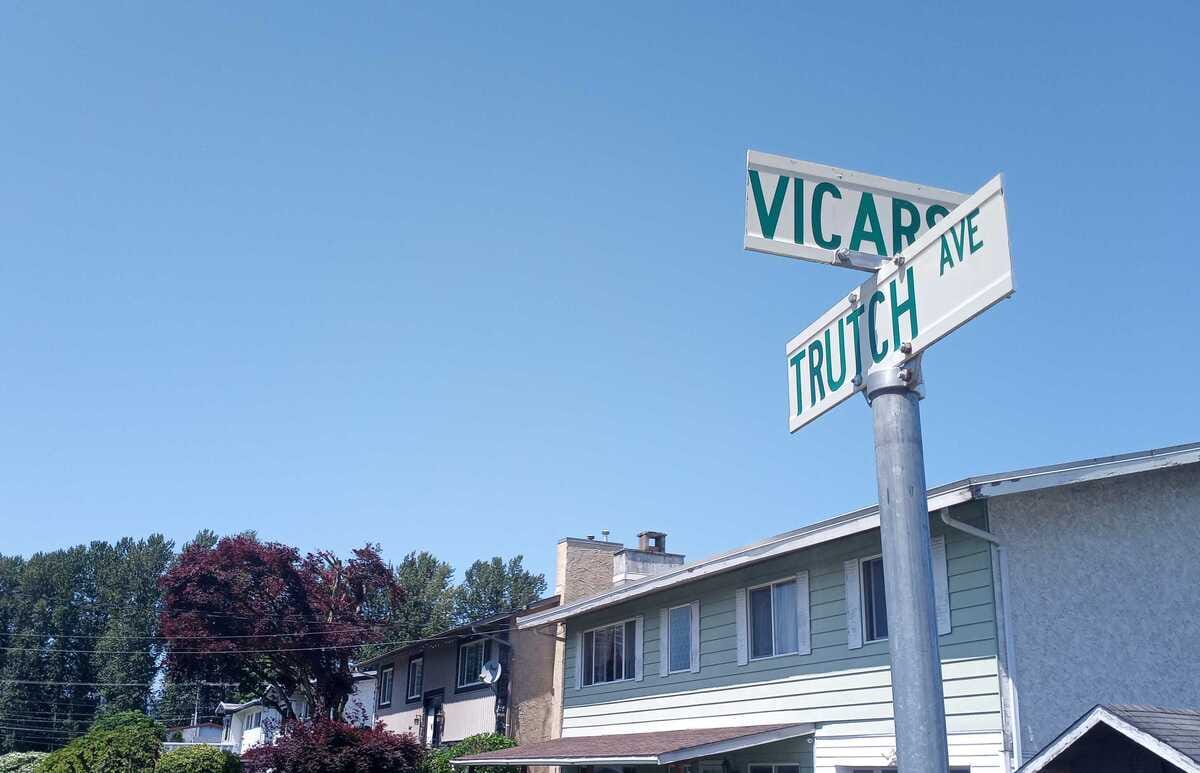
Trutch Avenue is home to 14 houses in north Chilliwack. 📷 Tyler Olsen
It can take a long time to rename a short street.
Trutch Avenue in Chilliwack was slated for renaming almost two years ago. The north Chilliwack road was named after Joseph Trutch, a pivotal character in BC’s colonial history who was infamous for his negative impact on Indigenous land rights.
The city agreed to rename the road, but consultation on the street’s new name remains in the hands of local Indigenous communities. In the meantime, Chilliwack has now introduced new rules designed to increase the diversity of road names in the city—and possibly reduce the need to rename new roads in the future.
Renaming Trutch Avenue
In June of 2021, Squiala Chief David Jimmie—who also sits as president of the Stólō Chiefs’ council—asked Chilliwack council to consider renaming Trutch Avenue.
Trutch was an engineer and B.C.'s first lieutenant-governor. He was also instrumental in the theft of Indigenous lands. In the 1860s, while reserves were being established, Trutch reduced the amount of land designated for Indigenous people by up to 92%. Many of the reserves in the Fraser Valley were shrunk dramatically from their suggested size—against the protests of local Indigenous leaders. One of the reserves, belonging to the Kwaw-Kwaw-Apilt First Nationreserve, sits directly across the street from the avenue that bears its architect’s name.
Jimmie pointed out these facts in 2021, and Chilliwack council agreed the street needed a new name—and one with significance to local Indigenous communities.
Two years later, Jimmie’s consultation process, which involves gathering input from several Stó:lō nations, is still ongoing. When a name is suggested, it will go before Chilliwack council for its approval. New street signs will be ordered. Residents of the newly-named road will get a confirmation letter. The city will also ensure that various entities—from emergency dispatch services to the postal service to schools—have the right information.
Chilliwack is not alone in replacing Trutch’s name. Victoria renamed its Trutch Street to Su’it Street (the Lekwungen word for “truth”) last July. Vancouver’s Trutch Street was renamed Musqueamview street, after the local Musqueam First Nation, in September 2022.
While a new name is selected, Chilliwack is making changes that will apply to new street names in the future.
Rules of the road (names)
In May, Chilliwack updated its “outdated” road naming policies. The new changes to the policy would increase the variety of names on city streets
The street-naming policy, which applies to developers who pay for, build, and name a new street or avenue in the city, was first crafted in 1997. It asked for names to have historical significance to Chilliwack, be relatively easy to spell and pronounce, and provided a list of historical suggestions.
All suggested names were inspired by European men (sometimes female family members were mentioned) who held notable pioneering roles in the city’s past. Several were business owners; a few were farmers or teachers. One man on the list, Charles Montgomery Tate, ran the Coqualeetz residential school in Chilliwack. (Tate was a complex figure; he started a residential school and opposed the Potlach but also created a Chinook-to-English dictionary and, later in life, played a key role in an Indigenous protest organization and was criticized by Indian Affairs administrators for encouraging Indigenous land claims.)
The new policy ditches the list of suggested names entirely. It adds that new street names will have no “adverse connotations.” It also changes the preference for “historically” significant names to those with “local significance”. The requirement that names be easily spelled and pronounced remains in place, though a similar suggestion that names have “fairly simple phonetic sounds” was removed. The request for simple spelling and pronunciation was clarified as important for “emergency response purposes.”
We need readers like you to become paying members so we can keep producing stories like these. We can’t do it without you.
Times are tough, and we know not everyone is in a position to pay for news. We’re in part reader-funded, and we rely on the ongoing generosity of those who can afford it.
This vital support means tens of thousands of locals in the Fraser Valley, and beyond, can continue getting local news, and in-depth, award-winning reporting.
Whether you give monthly or annually, your funding is vital in powering our local reporting for years to come.
Support us for as low at $1.62 per week, and rest assured you’re making a big impact in our community.
Join us, and become a Fraser Valley Insider member today.
